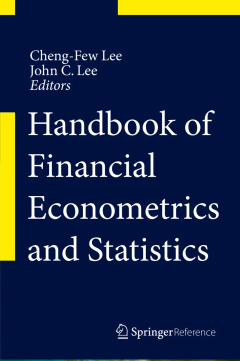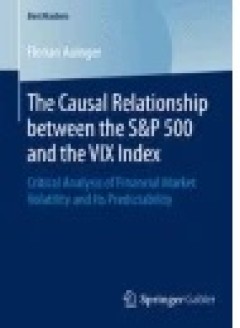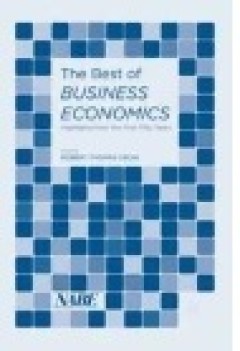Filter by

The Global Financial Crisis and the Indian Economy
After tracing the causes of the global financial crisis, the book focuses on two fundamental systemic issues connected with its manifestation: financial-sector regulation and the problem of the dollar-centric international monetary system, both of which have been widely cited among the important factors leading to the 2008 financial crisis. The important analytical question of monetary policy t…
- Edition
- -
- ISBN/ISSN
- 978-81-322-2395-5
- Collation
- XI, 142
- Series Title
- -
- Call Number
- -

Water, Politics and Money A Reality Check on Privatization
This book reveals all that can potentially happen when a private company takes over a local water supply system, both the good and the bad. Backed by real life stories of water privatization in action, author Manuel Schiffler presents a nuanced picture free of spin or fear mongering. Inside, readers will find a detailed analysis of the multiple forms of water privatization, from the outright…
- Edition
- -
- ISBN/ISSN
- 978-3-319-16691-9
- Collation
- XIX, 214
- Series Title
- -
- Call Number
- -

Valuing the Innovation Potentials of Firms What Theory Suggests, Practitione…
Jan Buchmann focuses on the valuation of a firm’s innovation potential based on that firm’s position in its lifecycle. Compared to existing research, the author does not center his research exclusively on mathematical valuation methodologies. Instead, the author compares collected valuation input data, data interpretation approaches, and valuation methodologies suggested by theory with the …
- Edition
- -
- ISBN/ISSN
- 978-3-658-09290-0
- Collation
- 9 b/w illustrations
- Series Title
- -
- Call Number
- -

Value Economics The Ethical Implications of Value for New Economic Thinking
The last financial crisis revealed a gap between business practice and ethics. In Value Economics, Griffiths and Lucas examine some of the reasons for this ethical gap and discuss the resulting loss of confidence in the financial system. One of the reasons has been hazy or inadequate thinking about how we value economic enterprises. With the close link between the creation of value and business…
- Edition
- -
- ISBN/ISSN
- 978-1-137-54187-1
- Collation
- XV, 281
- Series Title
- -
- Call Number
- -

Handbook of Financial Econometrics and Statistics
The Handbook of Financial Econometrics and Statistics provides, in four volumes and over 100 chapters, a comprehensive overview of the primary methodologies in econometrics and statistics as applied to financial research. Including overviews of key concepts by the editors and in-depth contributions from leading scholars around the world, the Handbook is the definitive resource for both class…
- Edition
- -
- ISBN/ISSN
- 978-1-4614-7749-5
- Collation
- CXII, 2897
- Series Title
- -
- Call Number
- 330 HAN

Understanding Consumer Financial Behavior Money Management in an Age of Fina…
Government policies, marketing campaigns of banks, insurance companies, and other financial institutions, and consumers' protective actions all depend on assumptions about consumer financial behavior. Unfortunately, many consumers have no or little knowledge of budgeting, financial products, and financial planning. It is therefore important that organizations and market authorities know why con…
- Edition
- -
- ISBN/ISSN
- 978-1-137-54425-4
- Collation
- XVI, 285
- Series Title
- -
- Call Number
- -

Holistic Active Management of Non-Performing Loans
This book discusses the most critical issues relating to the recovery of bad loans – a major problem that European banks urgently need to address and resolve. The book describes, in an innovative but also pragmatic way, the new approaches, techniques, and models for optimal management of non-performing loans (NPLs) and the maximization of their recovery value. Drawing on a rigorous academic b…
- Edition
- -
- ISBN/ISSN
- 978-3-319-25362-6
- Collation
- IX, 153
- Series Title
- -
- Call Number
- 330 SCA h

The Econometricians
This is the seventh book in a series of discussions about the great minds in the history and theory of finance. While the series addresses the contributions of scholars in our understanding of financial decisions and markets, this seventh book describes how econometrics developed and how its underlying assumptions created the underpinning of much of modern financial theory. The author shows tha…
- Edition
- -
- ISBN/ISSN
- 978-1-137-34137-2
- Collation
- XXI, 261
- Series Title
- Great Minds in Finance
- Call Number
- -

The Causal Relationship between the S&P 500 and the VIX Index
Florian Auinger highlights the core weaknesses and sources of criticism regarding the VIX Index as an indicator for the future development of financial market volatility. Furthermore, it is proven that there is no statistically significant causal relationship between the VIX and the S&P 500. As a consequence, the forecastability is not given in both directions. Obviously, there must be at least…
- Edition
- -
- ISBN/ISSN
- 978-3-658-08969-6
- Collation
- XIII, 91
- Series Title
- BestMasters
- Call Number
- -

The Best of Business Economics
Since its establishment in 1965, Business Economics has been an essential resource for those who use economics in the workplace. Its consistent intent has been to distinguish itself from academic journals by focusing on what is useful to practitioners of economics in their everyday work, and it has risen to become the leading forum for debating solutions to critical business problems, analyzing…
- Edition
- -
- ISBN/ISSN
- 978-1-137-57251-6
- Collation
- XVIII, 480
- Series Title
- -
- Call Number
- -
 Computer Science, Information & General Works
Computer Science, Information & General Works  Philosophy & Psychology
Philosophy & Psychology  Religion
Religion  Social Sciences
Social Sciences  Language
Language  Pure Science
Pure Science  Applied Sciences
Applied Sciences  Art & Recreation
Art & Recreation  Literature
Literature  History & Geography
History & Geography